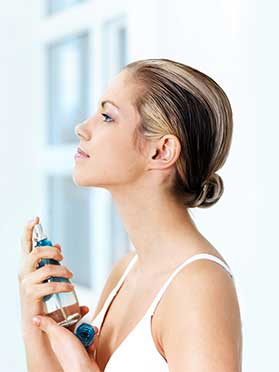Multiple Chemical Sensitivity Treatment in Largo, FL

In our day to day lives, we are exposed to large quantities of chemicals both indoors and outdoors. For some, this continual exposure can lead to a conditions referred to as multiple chemical sensitivity (MCS), a broad term that describes an allergy-like reaction or severe sensitivity to a variety of pollutants.
With Americans now spending 90 percent of their time indoors—and the Environmental Protection Agency (EPA) reporting that we have more exposure to chemical pollution indoors than out—it should come as no surprise that chemical sensitivities are on the rise. It may be a specific chemical you are sensitive to, or it could be a host of toxins in your home or office which cause a reaction. For that reason, chemical sensitivities can sometimes be diagnosed as "sick building syndrome" or environmental illness.
Left untreated, a chemical sensitivity can impact your immunity, hormone balance, nervous, respiratory and cardiovascular systems and compromise neurological function, which is why you should always receive medical care if you suspect something in your life is negatively impacting your health and wellbeing.
To schedule a consultation with a healthcare provider in Largo that specializes in multiple chemical sensitivity treatment, call (813) 536-3212 or contact Erin Bolton online.
Chemical Sensitivity Causes & Triggers
While there is no definitive cause of MCS, many health professionals agree that a compromised immune system may lead to multiple chemical sensitivity or exacerbate your symptoms. When your immune system is not functioning properly, you are more likely to have a reaction to a chemical trigger in your environment. This may explain why many people develop chemical sensitivities over a long period of time—as your immune system weakens, so too does your body's ability to process and detoxify incoming chemical pollutants.
The triggers in your body which initiate an allergy-like response will be unique to you. Chemical sensitivities are specific to your body, your genetic makeup and your environmental surroundings. Some chemical pollutants—like cigarette smoke—can cause a reaction in everyone, but some individuals have more pronounced reactions than others to certain chemical exposures.
Common triggers for chemical sensitivities or chemical allergies include perfume, cleaning products, pesticides or insecticides, car exhaust and new carpet. Some people even react to chemicals that others can tolerate easily like chlorine in pools or chemicals in dryer sheets. The neurotoxic chemical in mold are another common trigger, as are the PFAs in nonstick cookware and the formaldehyde in pressed wood. Flame-retardant furniture, curtains or bedding can cause chemical reactions, as can the foam in furniture and carpet backing, paint or cleaning supplies.
Chemical Sensitivity Symptoms
Chemical sensitivity symptoms, like allergy symptoms, can develop suddenly or gradually. You may become progressively less tolerant to chemical exposure over time, or you may have been able to tolerate exposure when you were younger, but as you age, you suddenly develop sensitivities you never experienced before.
Depending on the chemicals that cause a reaction in your body, symptoms can vary but may include:
- Nausea
- Itching
- Runny nose
- Skin rashes
- Burning eyes
- Respiratory reactions like sneezing, coughing, shortness of breath or having trouble breathing
- Fatigue
- Dizziness
- Congestion
- Sore throat
- Problems with sleep
- Headache
- Recurring sinus issues
- Confusion of difficulty concentrating
- Digestive reactions like diarrhea, gas or bloating
- Muscle stiffness or pain
- Changes in mental function or mood
- General sense of malaise
Multiple Chemical Sensitivities Diagnosis
Your healthcare provider can discuss your symptoms and exposure to chemicals with you to help determine whether you have chemical sensitivities. Since blood tests and physical exams will often present within normal ranges in spite of reactions to chemical exposure, your diagnosis will be based largely on the history you present. However, a blood test or other form of allergy testing will be recommended to rule out other types of allergies.
In order to help your doctor isolate which chemicals you are most sensitive to, it is helpful to keep a diary noting when you are exposed to certain chemicals and what your specific reactions to that chemical generally are.
Chemical Sensitivities Treatment
Chemical sensitivities cannot be cured but you can find help understanding the nature of your chemical sensitivity issues, addressing the symptoms and assessing risk factors. Doctors who treat chemical sensitivity typically focus on strengthening your immune system and treating any extreme symptoms causing considerable discomfort. Your chemical sensitivity treatment recommendations may include:
- Decreasing exposure to chemicals by ridding your house, office and car of all chemically-laden products like cleaning supplies, air fresheners, dryer sheets, etc. and opting for natural alternatives
- Purchasing only organic food in its natural state and avoiding processed and packaged foods
- Avoiding foods packaged in plastic and especially foods packaged to be heated in plastic or in containers that have high chemical content (e.g., TV dinners, microwave popcorn, etc.)
- Avoiding drinks, especially water, that come in plastic bottles
- Avoiding mold, especially in houses, automobiles, furnishings or clothing with prior water damage
- Detoxifying your body with vitamins, herbs and other supplements either taken orally or injected intravenously
- Getting tested for allergies, hormone imbalances and vitamin or nutritional deficiencies
- Exploring detoxification options like treatment in a low-temperature sauna (140 degrees), the use of bentonite clay or fasting
Determining whether you have chemical sensitivities may be the first step toward reclaiming your quality of life. Request more information about chemical sensitivities and your treatment options today. Call (813) 536-3212 or contact Erin Bolton online.
Evolution
Address
4691 Van Dyke RoadLutz, FL 33558
(813) 536-3212
www.evolution4health.com
Hours
Mon:
10:00 am - 4:00 pm
Tue:
10:00 am - 4:00 pm
Wed:
10:00 am - 5:00 pm
Thu:
10:00 am - 6:00 pm
Fri:
10:00 am - 3:00 pm
Sat:
Closed
Sun:
Closed


